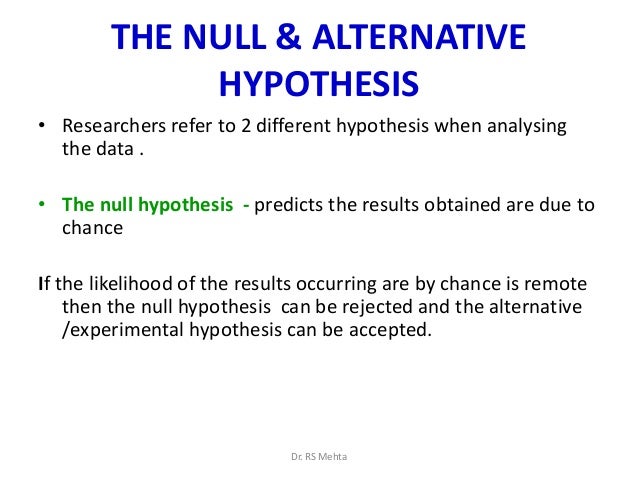A Good Hypothesis Should Be

A good hypothesis should be
CHARACTERISTICS OF A GOOD HYPOTHESIS 2.It should be empirically testable, whether it is right or wrong. 3.It should be specific and precise. 4.It should specify variables between which the relationship is to be established. 5.It should describe one issue only.
What describes a good hypothesis?
A good hypothesis relates an independent variable and a dependent variable. The effect on the dependent variable depends on or is determined by what happens when you change the independent variable.
What are the 3 required parts of a hypothesis?
A hypothesis is a prediction you create prior to running an experiment. The common format is: If [CAUSE], then [EFFECT], because [RATIONALE]. In the world of experience optimization, strong hypotheses consist of three distinct parts: a definition of the problem, a proposed solution, and a result.
What are the 4 parts of a good hypothesis?
Let's quickly investigate the four main parts of any hypothesis test:
- The Null and Alternative Hypotheses.
- The Test Statistic. ...
- Probability Values and Statistical Significance. ...
- The Conclusions of Hypothesis Testing.
What is good hypothesis in research?
Good hypotheses are testable hypotheses. This means that one can actually carry out the intent of the question reflected by the hypoth- esis. For example, number of hours of parental reading and outcome scores as measured by a test of comprehension are all objective and can be incorporated reliably.
What are the 8 characteristics of a hypothesis?
Characteristics & Qualities of a Good Hypothesis
- Power of Prediction. One of the valuable attribute of a good hypothesis is to predict for future.
- Closest to observable things. ...
- Simplicity. ...
- Clarity. ...
- Testability. ...
- Relevant to Problem. ...
- Specific. ...
- Relevant to available Techniques.
How do you make a good hypothesis?
How to Formulate an Effective Research Hypothesis
- State the problem that you are trying to solve. Make sure that the hypothesis clearly defines the topic and the focus of the experiment.
- Try to write the hypothesis as an if-then statement.
- Define the variables. ...
- Directional Hypothesis. ...
- Null Hypothesis.
What is the most important part of a hypothesis?
The most important element in a hypothesis is the prediction. It is the statement that will be tested and either proved or disproved.
What are the 2 qualities of a hypothesis?
The two primary features of a scientific hypothesis are falsifiability and testability, which are reflected in an “If…then” statement summarizing the idea and in the ability to be supported or refuted through observation and experimentation.
What makes a good strong hypothesis?
A strong hypothesis is concise, clear, and defines an expected relationship between the dependent and independent variables. This relationship should be stated as explicitly as possible and must be testable.
What are the 5 types of hypothesis?
Assumptions that are made on the basis of some evidence are known as hypotheses. ... Types of hypothesis are:
- Simple hypothesis.
- Complex hypothesis.
- Directional hypothesis.
- Non-directional hypothesis.
- Null hypothesis.
- Associative and Casual hypothesis.
What are the five importance of hypothesis?
It ensures the entire research methodologies are scientific and valid. It helps to assume the probability of research failure and progress. It helps to provide link to the underlying theory and specific research question. It helps in data analysis and measure the validity and reliability of the research.
What is a simple hypothesis?
Simple Hypothesis. A simple hypothesis predicts the relationship between a single dependent variable and a single independent variable. Complex Hypothesis. A complex hypothesis predicts the relationship between two or more independent and dependent variables.
What is a hypothesis example?
A simple hypothesis suggests only the relationship between two variables: one independent and one dependent. Examples: If you stay up late, then you feel tired the next day. Turning off your phone makes it charge faster.
How do you write a hypothesis?
How to Write Hypothesis in Research
- Predicts the relationship and outcome.
- Simple and concise – avoid wordiness.
- Clear with no ambiguity or assumptions about the readers' knowledge.
- Observable and testable results.
- Relevant and specific to the research question or problem.
What is the most important part of a hypothesis?
The most important element in a hypothesis is the prediction. It is the statement that will be tested and either proved or disproved.
What is the purpose of hypothesis?
Hypothesis Definition. Good science relies on accurately using the scientific method, and the scientific method relies on well-crafted hypotheses. A hypothesis is a specific prediction based on previous research that can be tested in an experiment.
What are the two important characteristics of a hypothesis?
The two primary features of a scientific hypothesis are falsifiability and testability, which are reflected in an “If…then” statement summarizing the idea and in the ability to be supported or refuted through observation and experimentation.
What does a hypothesis look like?
Examples of Hypotheses A hypothesis often follows a basic format of "If {this happens} then {this will happen}." One way to structure your hypothesis is to describe what will happen to the dependent variable if you change the independent variable.
What are types of hypothesis?
A hypothesis is an approximate explanation that relates to the set of facts that can be tested by certain further investigations. There are basically two types, namely, null hypothesis and alternative hypothesis.











Post a Comment for "A Good Hypothesis Should Be"